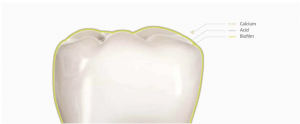
Silver has been used for centuries as an antimicrobial agent to kill bacteria and other microorganisms such as fungi and algae. Silver is not toxic to humans, which makes it safe to be included into health solutions. Today modern science has found ways to use silver for oral care in the form of nano silver and colloidal silver. Since silver has antibacterial properties, it can be used as a more effective and plant-based alternative to fluoride. You may have heard of colloidal silver solutions before, but what’s the difference between nano and colloidal silver products? And which is better for oral care?
Biocompatibility
When comparing nano silver vs colloidal silver, one of the most important things to understand is what biocompatibility is. Biocompatibility means that it is safe to use and will respond appropriately in certain conditions. Since oral care products impact our mouth microbiome, it is necessary to use products that work with our native bacteria. Biocompatibility depends on two things: the size of the particle and what is used as a capping agent. First off, colloidal silver nanoparticles are made without a capping agent. This means that they fall apart easily. Second, colloidal silver nanoparticles are inconsistent in particle size. On the other hand, silver nanoparticles are capped with plant extract. This makes them more stable and non–toxic to human tissue.
In addition, with advancements in technology, nanoparticles found in nano silver are more consistent in size than particles found in colloidal silver. Having consistent nanoparticle sizes is crucial for biocompatibility, which colloidal silver lacks. This is one of the major benefits of nano silver, as a more consistent particle size means more consistent results.
Stability
Unlike nano silver, colloidal silver does not have the ability to stay stable in various conditions. This is because colloidal silver is made by using the physical electric model by running a current through silver wires. This results in a division of silver particles without a consistent particle size and silver ions that are without capping agents and unstable outside of water. Silver nanoparticles are stable because their plant-based capping agent keeps them from decomposing. And, they respond favorably to various environments such as salts and biomolecules. This makes a nano silver solution much more effective than a colloidal silver solution with unstable silver ions and inconsistent particle sizes. When it comes to oral care, it’s crucial to choose a product that has antibacterial properties from particles that are chemically stable.
Reaction to Biofilm
Biofilm is the layer of bacteria that builds up over the surface of your teeth, commonly referred to as plaque. A buildup of biofilm can create oral issues because it eats away at the enamel, causing decay. How colloidal silver and nano silver solutions react to biofilm plays a crucial role in how effective they can be at penetrating the outer coating of the oral biofilm. Colloidal silver cannot be used with other beneficial agents and has a weak effect on the biofilm. Therefore, it does not do a sufficient job of protecting enamel and balancing the oral biofilm by reducing acid. Because of the benefits of Nano Silver, it can be used at much lower concentrations and can latch onto and penetrate biofilms with ease. At the nano level, silver particles can destroy bacteria in high rations, while colloidal silver can only remove bad bacteria in low ratios. Silver nanoparticles can be used with other agents which makes it an ideal candidate for oral care solutions. Nano silver solutions also release silver ions directly inside the biofilm and target acid, which is beyond the capabilities of more traditional colloidal silver solutions. Nano Silver balances the acid in the mouth, which can prevent decay that leads to cavities and other oral health issues.
The Nano Silver Solution
When comparing nano silver vs colloidal silver for oral care, it is clear to see that a nano silver solution is the best option for oral care and far outweighs a colloidal silver solution. Nano particles are much more uniform, allowing for consistent and safe results. Nano silver has been proven in studies to be more effective than colloidal silver at killing bacteria, the main cause for oral decay. Nano silver is also faster-acting and requires lower concentrations than colloidal silver to achieve the same results. So if you’re looking for an oral care product that will give you the best possible protection against bacteria while staying natural, our line of nano silver products is the way to go. We have a special line of nano silver oral care solutions that use our own patented technology to provide the most unique nano silver for optimal oral health.
